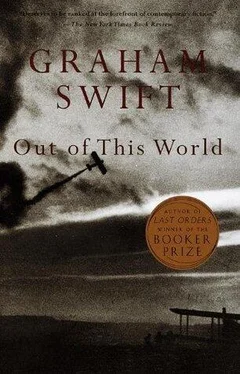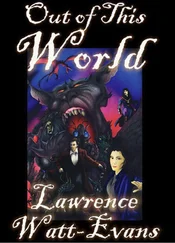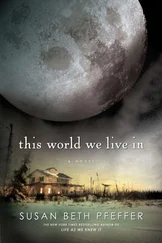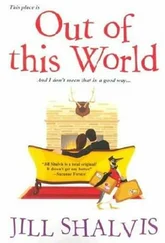Graham Swift - Out of This World
Здесь есть возможность читать онлайн «Graham Swift - Out of This World» весь текст электронной книги совершенно бесплатно (целиком полную версию без сокращений). В некоторых случаях можно слушать аудио, скачать через торрент в формате fb2 и присутствует краткое содержание. Год выпуска: 2012, Издательство: Vintage, Жанр: Современная проза, на английском языке. Описание произведения, (предисловие) а так же отзывы посетителей доступны на портале библиотеки ЛибКат.
- Название:Out of This World
- Автор:
- Издательство:Vintage
- Жанр:
- Год:2012
- ISBN:нет данных
- Рейтинг книги:3 / 5. Голосов: 1
-
Избранное:Добавить в избранное
- Отзывы:
-
Ваша оценка:
- 60
- 1
- 2
- 3
- 4
- 5
Out of This World: краткое содержание, описание и аннотация
Предлагаем к чтению аннотацию, описание, краткое содержание или предисловие (зависит от того, что написал сам автор книги «Out of This World»). Если вы не нашли необходимую информацию о книге — напишите в комментариях, мы постараемся отыскать её.
Out of This World — читать онлайн бесплатно полную книгу (весь текст) целиком
Ниже представлен текст книги, разбитый по страницам. Система сохранения места последней прочитанной страницы, позволяет с удобством читать онлайн бесплатно книгу «Out of This World», без необходимости каждый раз заново искать на чём Вы остановились. Поставьте закладку, и сможете в любой момент перейти на страницу, на которой закончили чтение.
Интервал:
Закладка:
I wore a dark-grey suit and a reticent tie. To look as anonymous and as much like an accountant as possible. To avoid the bush-jacket image. But under the studio lights I started to sweat.
I still hear that young and sure-voiced interviewer explaining to our invisible audience with the air of an amateur psychologist, that I came from ‘privileged circumstances’ (public school, Oxford, family business) but had ‘turned my back on all that’ for the rigours of news photography. Furthermore, that while my father was the head of an arms company (BMC spelling, for those who weren’t aware in these days of burgeoning flower-power: ‘Beech Munitions Company’) and was a distinguished former soldier, I had ‘specialized’ in photographs depicting the evils of war.
Had rebellion and protest been factors in my career?
I said I did not see myself as a professional rebel. I saw myself as an observer, a visual reporter. I disliked the word ‘specialized’, since I had photographed many other things beside wars.
My interviewer smiled as if we could now relax. He had established a disputatious tone. This would be good TV.
If not rebellion, then emulation perhaps? If we could stick with war for a while. (We stuck with war for most of the programme.) My father was a holder of the V.C. and a hero of the First War, and a fair proportion (let’s say) of my work might be described as ‘front-line’ photography — pictures that must have taken some nerve (he gave the word a subtle stress) to take.
I said that it took a good deal less nerve to photograph many of the situations I had photographed than to be an active and involuntary participant of those situations. That a large part of a photo-journalist’s work was spent on the relative periphery of events or in routine concerns (transport, communication, the protection of one’s gear). That you went into things with the knowledge that you could soon pull out (press men also were ‘privileged’). Of course, you were sometimes inescapably caught up, but then it wasn’t a case of heroics, just of dedication to the job.
What were my most hazardous assignments? Had I had any close calls? Had anyone tried to smash my camera, seize my film? Etc. Etc.
I told two half-prepared anecdotes (Algiers, ’61; Stanleyville, ’64) and one (poor) joke: my most dangerous assignment had been to photograph the film actress D— in a New York hotel, the day after her live-theatre come-back had been unanimously panned by the critics. Couldn’t we get back to the photographs themselves?
Of course. Did I think there were any limitations to ‘dedication to the job’?
That needed explaining.
Flash on to screen, while interviewer speaks, photograph of Vietnamese woman, with contorted face, holding a blood-soaked child.
‘This photo of a grieving mother, included in your Aftermaths collection, appeared, in full colour, in millions of Sunday newspapers shortly after the event it records. Mr Beech, your work has been much praised — even if praise may not be your object. But many people take exception to it. They would say that you invade privacy.’
He leant back expectantly in his chair.
(Later, I could not help following that young man’s career, through the echelons of TV, in the Sixties and Seventies. At the end of our twenty-five minutes, as the credits rolled and we were off the air, he said, without a trace of innuendo, ‘That was tremendous! Really good !’ and proffered his copy of Aftermaths for signing.)
I said that in the case of that particular photo, privacy was hardly an issue. The woman’s village had just been destroyed by American rockets. She was by no means the only grieving mother. I was by no means the only onlooker. I imagined the fact that her grief was on view was the least important element of it.
(Cut from talking head back to photo: close in on central image.)
Frankly, I found the idea of ‘invaded privacy’ curiously misplaced. Since the suffering observed in my photographs was frequently the result of quite literal and traumatic invasions. When civilian homes were bombed or communities forced into refugeedom, or even when a soldier was conscripted into a war he did not understand, this was a theft of privacy of much greater significance than any taking of a photo. In my experience, privacy was a notion that in fact meant little to a great number of people in the world, because they did not possess it or had little chance of keeping it. It was — I paused over the word — a privilege of the West. A notion particularly dear to the English. Whose privacy were we talking about anyway? The privacy of the people in my photographs or the privacy of Sunday-morning newspaper readers wanting to enjoy their breakfasts?
Cut to Ia Drang valley, South Vietnam, November ’65. Supine G.I., encircled by two anguished buddies (helmets removed: dangled crucifix just visible) and medic with drip-pack. (Strong breeze blows across group: helicopter rotors, out of picture.)
Cut to north-eastern Congo, October ’64. Three prisoners squatting on ground beneath banana-leaf canopy, hands bound behind backs and necks linked with a rope. A guard or captor stands behind them in jungle camouflage fatigues, holding an automatic rifle. The guard is burly and erect and totally absorbed for the moment with having his picture taken. He beams at the camera, like a jovial stall-holder. The prisoners, clad only in shorts and singlets, are also facing the camera, but they are wearing blindfolds.
Cut to Birmingham, Alabama, September ’63. Bare interior, with family group. A listless-looking man lies, eyeing camera, on a mattress, rear of picture. A bulky woman, centre picture, in ragged cotton shift, arranges the hair of a second female figure who sits on an upturned crate and is in garish contrast to her surroundings. She is got up in the costume of a whore: tight fake-satin dress, high heels, heavy lipstick, piled-up hair. This superficially makes her look older than she is, but at the same time accentuates her actual youth. You can tell from the angularity of her body she can be no more than twelve.
While these pictures appeared in quick (too quick) succession on the screen, they were simultaneously displayed by back projector behind us in the studio. As the first appeared, my interviewer swivelled his chair round, thumb and forefinger to his chin, in an exaggerated gesture of attention, leaving me to do likewise or to be caught briefly looking abandoned and awkward. (This too was a picture!) Before the third image disappeared and when we were once more on camera, he swivelled back again, with equal studiedness, catching the camera’s eye.
‘But do you not often feel, when taking your photographs, like an intruder?’
Yes, I did often feel that. Precisely that. But this struck me as being in the nature of photography itself, especially of news photography. You could not photograph the news by prior arrangement. The great value of photography was its actuality, its lack of prejudicial tact, its very power of intrusion. This could not be achieved by knocking at the door first.
‘A sort of shock tactics?’
‘I wouldn’t say that.’
‘But you intend to shock. You set out to do that?’
‘I don’t have intentions. I don’t engineer effects. If my pictures shock it is because their subject-matter shocks.’
‘But you select the subject-matter. Isn’t that a kind of engineering?’
‘I’m a news photographer. I can’t select the news.’
‘But would you say then that there is no personal element in your work. Nothing of yourself. No bit of Harry Beech?’
‘The point of a photograph isn’t to portray the photographer. If someone looks at a photo of mine and they think of me, the photographer, then I’d say that that photograph has failed.’
Читать дальшеИнтервал:
Закладка:
Похожие книги на «Out of This World»
Представляем Вашему вниманию похожие книги на «Out of This World» списком для выбора. Мы отобрали схожую по названию и смыслу литературу в надежде предоставить читателям больше вариантов отыскать новые, интересные, ещё непрочитанные произведения.
Обсуждение, отзывы о книге «Out of This World» и просто собственные мнения читателей. Оставьте ваши комментарии, напишите, что Вы думаете о произведении, его смысле или главных героях. Укажите что конкретно понравилось, а что нет, и почему Вы так считаете.












